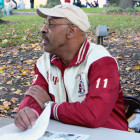
Mothers & Fathers; Sons & Daughters
|
Two mothers and a father talk about what it's like to be the parent of a substance user in this affecting piece about frustration and loss.
Juvenile Justice Information Exchange (https://jjie.org/page/187/)

In late September, Torri was driving down the highway with her 11-year-old son Junior in the back seat when her phone started ringing.
It was the Hamilton County Sheriff’s deputy who worked at Junior’s middle school in Chattanooga, Tennessee. Deputy Arthur Richardson asked Torri where she was. She told him she was on the way to a family birthday dinner at LongHorn Steakhouse.
“He said, ‘Is Junior with you?’” Torri recalled.
Earlier that day, Junior had been accused by other students of making a threat against the school. When Torri had come to pick him up, she’d spoken with Richardson and with administrators, who’d told her he was allowed to return to class the next day. The principal had said she would carry out an investigation then. ProPublica and WPLN are using a nickname for Junior and not including Torri’s last name at the family’s request, to prevent him from being identifiable.
When Richardson called her in the car, Torri immediately felt uneasy. He didn’t say much before hanging up, and she thought about turning around to go home. But she kept driving. When they walked into the restaurant, Torri watched as Junior happily greeted his family.
Soon her phone rang again. It was the deputy. He said he was outside in the strip mall’s parking lot and needed to talk to Junior. Torri called Junior’s stepdad, Kevin Boyer, for extra support, putting him on speaker as she went outside to talk to Richardson. She left Junior with the family, wanting to protect her son for as long as she could ...

Two mothers and a father talk about what it's like to be the parent of a substance user in this affecting piece about frustration and loss.

By the time I was 24 I had spent 10 years in and out of juvenile justice programs and prisons in Iowa. Four of those years were spent languishing in solitary confinement cells and one year in Iowa’s own Supermax unit.

Imagine you are feeling sick and your doctor hands you this hand-scrawled prescription: LEECH THERAPY. If you are like me, you may run out of the doctor’s office screaming.

When communities want to snip the school-to-prison pipeline, how do they do it?
They take an intentional, multitiered approach: They revise their code of conduct, redefine the role of school police, build a positive school climate, address problematic behavior in a positive way, and address bias — among other strategies
My name is Jensen Ramos and I am currently serving a life sentence for committing a crime as a juvenile.

Key legislation that would strengthen protections for youth in the juvenile justice system still has a chance in the Senate.

Can we treat, heal and prevent reoffending in a youth if we have not treated and healed the primary parent of the youth?

On a Tuesday afternoon in December, Richard Walker stood on the corner outside the city’s social services building and hollered.